北师大高一英语U3l1导学案
高中英语 Unit3 Lesson1 P1教学设计 北师大版必修1
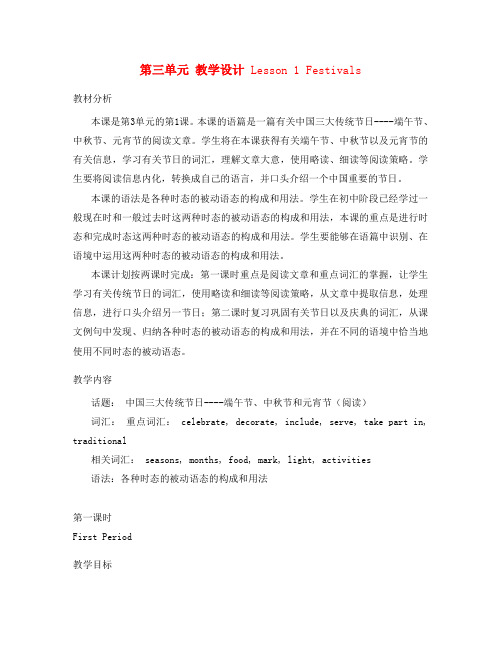
第三单元教学设计Lesson 1 Festivals教材分析本课是第3单元的第1课。
本课的语篇是一篇有关中国三大传统节日----端午节、中秋节、元宵节的阅读文章。
学生将在本课获得有关端午节、中秋节以及元宵节的有关信息,学习有关节日的词汇,理解文章大意,使用略读、细读等阅读策略。
学生要将阅读信息内化,转换成自己的语言,并口头介绍一个中国重要的节日。
本课的语法是各种时态的被动语态的构成和用法。
学生在初中阶段已经学过一般现在时和一般过去时这两种时态的被动语态的构成和用法,本课的重点是进行时态和完成时态这两种时态的被动语态的构成和用法。
学生要能够在语篇中识别、在语境中运用这两种时态的被动语态的构成和用法。
本课计划按两课时完成:第一课时重点是阅读文章和重点词汇的掌握,让学生学习有关传统节日的词汇,使用略读和细读等阅读策略,从文章中提取信息,处理信息,进行口头介绍另一节日;第二课时复习巩固有关节日以及庆典的词汇,从课文例句中发现、归纳各种时态的被动语态的构成和用法,并在不同的语境中恰当地使用不同时态的被动语态。
教学内容话题:中国三大传统节日----端午节、中秋节和元宵节(阅读)词汇:重点词汇: celebrate, decorate, include, serve, take part in, traditional相关词汇: seasons, months, food, mark, light, activities语法:各种时态的被动语态的构成和用法第一课时First Period教学目标在本课学习结束时,学生能够:1. 总结和正确使用有关节日(尤其是中国传统节日)的词汇;2.运用本课所学的相关词汇口头介绍一个重要的节日教学过程注:IP=Interactive Pattern; T=Teacher; Ss=Students; CW=Class Work; IW=Individual Work; PW= Pair Work; GW=Group Work第一课时学案I. Listening: Which five celebrations do you hear?II. Discussing: What other Chinese festivals do you know? When are they celebrated?Ⅲ. Fast reading:1) What do the Lantern Festival and the Dragon Boat Festival mark?2) Why is the Mid-Autumn Festival so important?Ⅳ. Careful readingⅤ. Group work: Introduce a festival which is most important in China for children, or for young people, or for old people, or for women and men.第一课时讲义(见PPT)第二课时(second period)北京市十一学校于艳教学目标在本课学习结束时,学生能够:1.学生能够识别五种时态的被动语态;2.学生能够在上一课的基础上,运用所学词汇和不同的被动语态进行口头介绍庆祝活动。
北师大版高一英语必修第三册(2019版)Unit1_Lesson3_导学案(1)
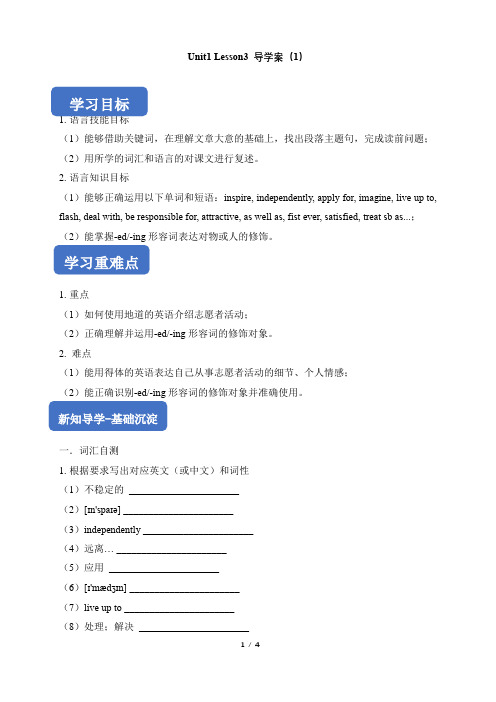
Unit1 Lesson3 导学案(1)学习目标1.语言技能目标(1)能够借助关键词,在理解文章大意的基础上,找出段落主题句,完成读前问题;(2)用所学的词汇和语言的对课文进行复述。
2.语言知识目标(1)能够正确运用以下单词和短语:inspire, independently, apply for, imagine, live up to, flash, deal with, be responsible for, attractive, as well as, fist ever, satisfied, treat sb as...;(2)能掌握-ed/-ing形容词表达对物或人的修饰。
学习重难点1.重点(1)如何使用地道的英语介绍志愿者活动;(2)正确理解并运用-ed/-ing形容词的修饰对象。
2. 难点(1)能用得体的英语表达自己从事志愿者活动的细节、个人情感;(2)能正确识别-ed/-ing形容词的修饰对象并准确使用。
新知导学-基础沉淀一.词汇自测1.根据要求写出对应英文(或中文)和词性(1)不稳定的______________________(2)[ɪn'spaɪə] ______________________(3)independently ______________________(4)远离… ______________________(5)应用______________________(6)[ɪ'mædʒɪn] ______________________(7)live up to ______________________(8)处理;解决______________________(9)对…负责______________________(10)first ever ______________________(11)charity ______________________(12)联系;联络______________________(13)把…当做… ______________________(14)flash ______________________(15)[ə'træktiv] ______________________二.语法自测1. 单项选择(1)Laws that punish parents for their little children’s actions against the laws get parents _____.A. worriedB. to worriedC. worryingD. Worry (2)The little boy isn’t getting on well in maths and worse still, he is even unwilling to go to school. With her son _____, she feels very ______.A. disappointing; worryingB. disappointing; worriedC. disappointed; worriedD. disappointed; worrying(3)After the Anti-terrorist War, the American soldiers returned home,______.A. safe but tiredB. safely but tiredC. safe and tiringD. safely and tiring(4)As we all know, typing is a ______ job to a ______ heart.A. tired; tiredB. tired; tiringC. tiring; tiredD. tiring; tiring(5)Poor boy! His________ looks and ________hands suggested he was very afraid.A. frightful; tremblingB. frightened; tremblingC. frightening; trembledD. frightened; trembly2.用词的适当形式填空(1)His ______________ question made me ____________ greatly. (embarrass)(2)He was _________ at the ________ news, so there was a ___________ look on his face.(disappoint)(3)We were all____________ at his __________ experience in South Africa. (amaze)(4)Jane is __________ because her job is ___________, which __________ her parents. (bore)(5)We were deeply ___________ by his performance. That is to say, his performance left a deep ____________ on us.(impress)三.综合自测1. 语法填空Zhang Tian graduated (1)_________ university and got a teacher’s certificate last year. His parents wanted him to get a good job in Shanghai. But he (2)_________ (inspire) by the idea of living independently away from home. So he applied (3)_________ and became a volunteer teacher in a village school. Bringing with him lots of books, clothes, and two pairs of trainers, Zhang Tian travelled to the village with (4)________ eager heart. He imagined all sorts of exciting things about living and teaching in a village.However, not everything lived up to Zhang Tian’s hopes. The school was much (5)________ (small) than he expected, with only three classrooms. In front of the classrooms, there was a playground (6)_______ got dusty on windy days and muddy on rainy days. Living in the village was also more challenging than he had thought. The power and water supplies (7)_______ (be) unstable, so he could only shower every three or four days, and he had to learn how (8)__________ (cook). The thought of leaving once flashed through his mind, but he quickly gave up the idea and found ways to deal with the challenges.The school had just three teachers and Zhang Tian was the only English teacher. The other two local teachers were (9)_________ (response) for maths and Chinese. To make school life healthier and livelier for his students, Zhang Tian introduced more subjects to the school — music, art and PE. It is not (10)_________ (surprise) that PE is the kids' favourite subject! Their school lives are now more attractive and interesting, and they enjoy playing football in the playground, as well as singing songs they’ve learnt.【答案】1. 单选ABACB2. 用括号里给的单词的适当形式填空(1) embarrassing, embarrassed(2) disappointed, disappointing, disappointed(3) amazed, amazing(4) bored, boring, bores(5) impressed, impression。
高中英语(北师大版必修1)导学案:Unit 3 CelebrationsL1阅读
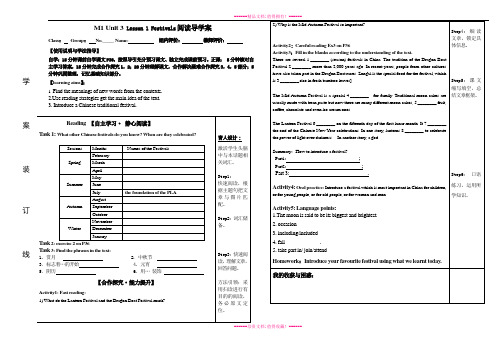
3.标志着…的开始4.元宵
5.阴历6.用…装饰
【合作探究·能力提升】
Activity1:Fast reading:
1) Whatdo the Lantern Festival and the Dragon Boat Festival mark?
2) Why is the Mid-Autumn Festival so important?
The Mid-Autumn Festival is a special 4.________ for family. Traditional moon cakes are usually made with bean paste but now there are many different moon-cakes, 5.________ fruit, coffee, chocolate and even ice-cream ones.
Summary:How to introduce a festival?
Part1:;
Part2:;
Part 3:.
Activity4:Oral practice:Introduce a festival which is most important inChinafor children, or for young people, or for old people, or for women and men.
The Lantern Festival 6.________ on the fifteenth day of the first lunar month. It 7.________ the end of the Chinese New Year celebrations. In one story, lanterns 8.________ to celebrate the power of light over darkness. In another story, a god
北师大版高中英语模块一Unit3 Lesson1 Festivals 导学案
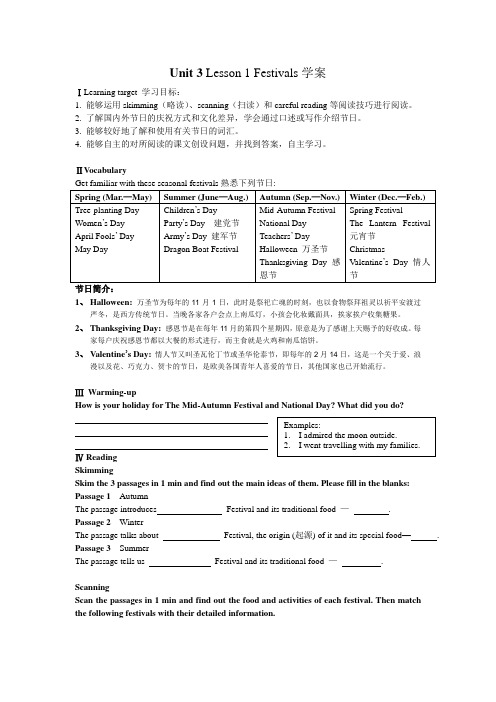
Unit 3 Lesson 1 Festivals学案ⅠLearning target 学习目标:1. 能够运用skimming(略读)、scanning(扫读)和careful reading等阅读技巧进行阅读。
2. 了解国内外节日的庆祝方式和文化差异,学会通过口述或写作介绍节日。
3. 能够较好地了解和使用有关节日的词汇。
4. 能够自主的对所阅读的课文创设问题,并找到答案,自主学习。
ⅡVocabulary1、Halloween: 万圣节为每年的11月1日,此时是祭祀亡魂的时刻,也以食物祭拜祖灵以祈平安渡过严冬,是西方传统节日。
当晚各家各户会点上南瓜灯,小孩会化妆戴面具,挨家挨户收集糖果。
2、Thanksgiving Day: 感恩节是在每年11月的第四个星期四,原意是为了感谢上天赐予的好收成。
每家每户庆祝感恩节都以大餐的形式进行,而主食就是火鸡和南瓜馅饼。
3、Valentine’s Day:情人节又叫圣瓦伦丁节或圣华伦泰节,即每年的2月14日,这是一个关于爱、浪漫以及花、巧克力、贺卡的节日,是欧美各国青年人喜爱的节日,其他国家也已开始流行。
ⅢWarming-upHow is your holiday for The Mid-Autumn Festival and National Day? What did you do?SkimmingSkim the 3 passages in 1 min and find out the main ideas of them. Please fill in the blanks: Passage 1 AutumnThe passage introduces Festival and its traditional food —.Passage 2 WinterThe passage talks about Festival, the origin (起源) of it and its special food—. Passage 3 SummerThe passage tells us Festival and its traditional food —.ScanningScan the passages in 1 min and find out the food and activities of each festival. Then matchthe following festivals with their detailed information.Careful ReadingEach group should choose one passage and raise some relative (相应的) questions to ask the students from other groups. Then find out the answers. Please use the modals below. Passage1. 时间:When is The Lantern Festival celebrated?—It is celebrated on the 15th day of the first lunar month.2.特殊意义:What’s the special meaning of Mid-Autumn Festival?—It is a special occasion for family.3.食物:What traditional food is eaten on the Dragon Boat Festival?—People will eat zongzi.4.活动: What will be done on the Lantern Festival?Ⅴ Extension 知识拓展Do you know other special festivals? Enjoy the video clips first and pay attention to what people do on the festivals.1.Bun Festival, Cheung Chau, HK在香港太平清醮,长洲北帝庙前会有三个挂满包子的包山,高约13米,每个包山挂有约16000个包子,又叫“平安包”。
北师大版高一英语必修第三册(2019版)Unit1_Lesson1_导学案(2)
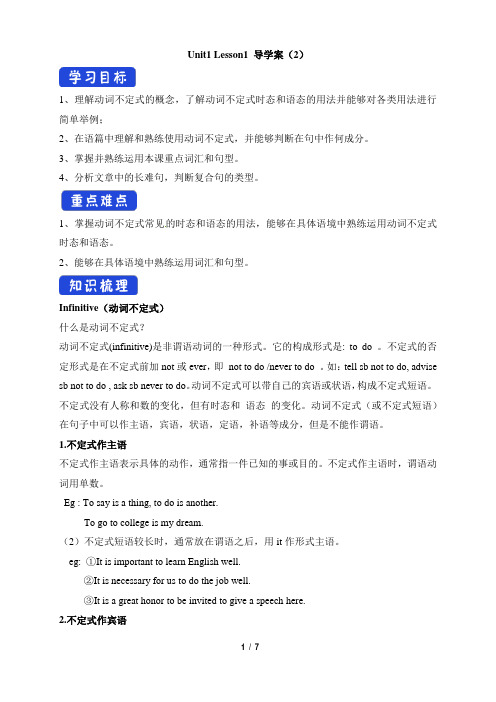
Unit1 Lesson1 导学案(2)1、理解动词不定式的概念,了解动词不定式时态和语态的用法并能够对各类用法进行简单举例;2、在语篇中理解和熟练使用动词不定式,并能够判断在句中作何成分。
3、掌握并熟练运用本课重点词汇和句型。
4、分析文章中的长难句,判断复合句的类型。
1、掌握动词不定式常见的时态和语态的用法,能够在具体语境中熟练运用动词不定式时态和语态。
2、能够在具体语境中熟练运用词汇和句型。
Infinitive(动词不定式)什么是动词不定式?动词不定式(infinitive)是非谓语动词的一种形式。
它的构成形式是: to do 。
不定式的否定形式是在不定式前加not或ever,即not to do /never to do 。
如:tell sb not to do, advise sb not to do , ask sb never to do。
动词不定式可以带自己的宾语或状语,构成不定式短语。
不定式没有人称和数的变化,但有时态和语态的变化。
动词不定式(或不定式短语)在句子中可以作主语,宾语,状语,定语,补语等成分,但是不能作谓语。
1.不定式作主语不定式作主语表示具体的动作,通常指一件已知的事或目的。
不定式作主语时,谓语动词用单数。
Eg : To say is a thing, to do is another.To go to college is my dream.(2)不定式短语较长时,通常放在谓语之后,用it作形式主语。
eg: ①It is important to learn English well.②It is necessary for us to do the job well.③It is a great honor to be invited to give a speech here.2.不定式作宾语(1)to do表示特定,具体,将来的动作。
常只用不定式作宾语的动词(want,wish,hope,long,expect,desire,intend,decide,ask,promise,aim,offer,agree,plan,learn,cho ose,refuse,fail,manage,pretend等。
高中英语Unit3onLesson1TheSixthExtinction教案北师大版选择性必修第一册
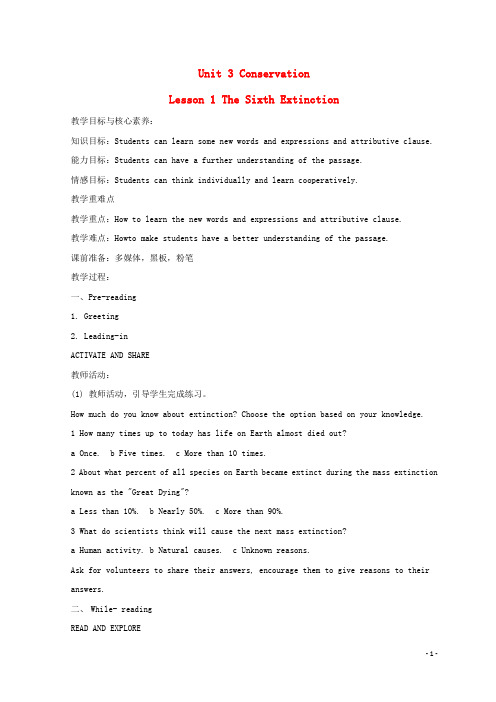
Unit 3 ConservationLesson 1 The Sixth Extinction教学目标与核心素养:知识目标:Students can learn some new words and expressions and attributive clause. 能力目标:Students can have a further understanding of the passage.情感目标:Students can think individually and learn cooperatively.教学重难点教学重点:How to learn the new words and expressions and attributive clause.教学难点:Howto make students have a better understanding of the passage.课前准备:多媒体,黑板,粉笔教学过程:一、Pre-reading1. Greeting2. Leading-inACTIVATE AND SHARE教师活动:(1) 教师活动,引导学生完成练习。
How much do you know about extinction? Choose the option based on your knowledge.1 How many times up to today has life on Earth almost died out?a Once.b Five times.c More than 10 times.2 About what percent of all species on Earth became extinct during the mass extinction known as the "Great Dying"?a Less than 10%.b Nearly 50%.c More than 90%.3 What do scientists think will cause the next mass extinction?a Human activity.b Natural causes.c Unknown reasons.Ask for volunteers to share their answers, encourage them to give reasons to their answers.二、While- readingREAD AND EXPLORE1. 学生活动:阅读文章,回答问题。
北师大版高中英语必修3全册导学案
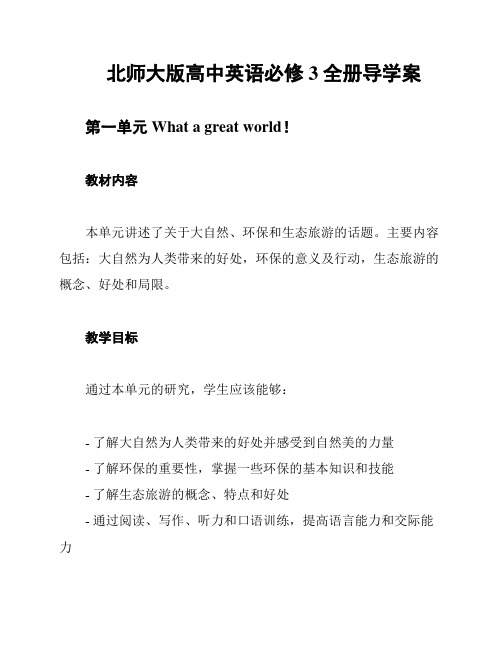
北师大版高中英语必修3全册导学案第一单元 What a great world!教材内容本单元讲述了关于大自然、环保和生态旅游的话题。
主要内容包括:大自然为人类带来的好处,环保的意义及行动,生态旅游的概念、好处和局限。
教学目标通过本单元的研究,学生应该能够:- 了解大自然为人类带来的好处并感受到自然美的力量- 了解环保的重要性,掌握一些环保的基本知识和技能- 了解生态旅游的概念、特点和好处- 通过阅读、写作、听力和口语训练,提高语言能力和交际能力教学重点- 大自然为人类带来的好处及其意义- 了解环保的重要性,了解环保的基本知识和技能- 生态旅游的概念、特点和好处教学难点- 如何准确地描述大自然的美和力量- 如何鼓励学生行动起来,为环保贡献自己的力量- 如何让学生从生态旅游中得到更多的收获教学方法本单元既重视学生的语言能力和交际能力的培养,又注重学生的生态环保意识的提高。
在教学过程中,老师应采用多种教学方法,如阅读教学法、讲授教学法、讨论教学法、听力教学法、演讲教学法、写作教学法和实践教学法等。
研究建议- 在掌握基本知识的基础上,多做练,尤其是口语和写作练- 多参加有关环保和生态旅游的活动,了解最新科技和理念- 多与他人交流,分享自己的思想和见解总结本单元是高中英语必修3全册的第一单元,主要介绍了大自然、环保和生态旅游的话题。
通过阅读、写作、听力和口语训练,学生可以提高语言能力和交际能力,掌握环保知识和技能,了解生态旅游的概念和好处。
建议学生在学习过程中积极思考,抓住重点,提高自己的学习效果,为未来的发展奠定良好的基础。
北师大版高一英语必修第三册(2019版)Unit1_SectionⅥ精品导学案
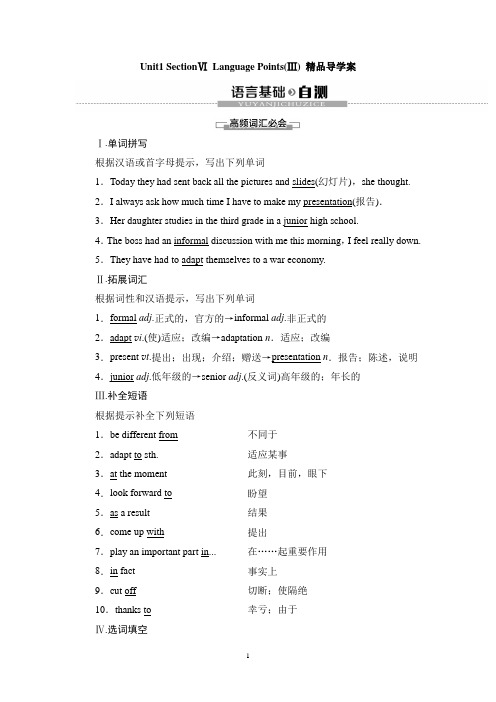
Unit1 SectionⅥLanguage Points(Ⅲ) 精品导学案Ⅰ.单词拼写根据汉语或首字母提示,写出下列单词1.Today they had sent back all the pictures and slides(幻灯片),she thought. 2.I always ask how much time I have to make my presentation(报告).3.Her daughter studies in the third grade in a junior high school.4.The boss had an informal discussion with me this morning,I feel really down. 5.They have had to adapt themselves to a war economy.Ⅱ.拓展词汇根据词性和汉语提示,写出下列单词1.formal adj.正式的,官方的→informal adj.非正式的2.adapt v i.(使)适应;改编→adaptation n.适应;改编3.present v t.提出;出现;介绍;赠送→presentation n.报告;陈述,说明4.junior adj.低年级的→senior adj.(反义词)高年级的;年长的Ⅲ.补全短语根据提示补全下列短语1.be different from不同于2.adapt to sth. 适应某事3.at the moment 此刻,目前,眼下4.look forward to 盼望5.as a result 结果6.come up with 提出7.play an important part in... 在……起重要作用8.in fact 事实上9.cut off 切断;使隔绝10.thanks to 幸亏;由于Ⅳ.选词填空选用上述短语的适当形式填空1.Thanks to the bad weather,the match had been cancelled. 2.He came up with good ideas for the product promotion. 3.He quickly adapted to the climate in the high mountains. 4.At the moment he doesn't have a penny to his name. 5.We look forward to welcoming you and your party. 6.The floods have cut off our supplies.[寻规律、巧记忆]v.+-ation→n. v.+off→动词短语imagination想象explanation解释simplification简化put off取消turn off关set off出发背教材原句记句式结构仿写促落实1.In the 18th and 19th centuries,mostEnglish people ate only two main mealseach day-breakfast in the morning and alarge supper which usually wasn't served until seven o'clock in the evening.在18世纪和19世纪,大部分英国人每天吃两顿饭,早晨的早餐和直到晚上七点才吃的晚饭。
高中英语 UUnit 3 celebration lesson 1导学案 北师大版必修1

高中英语 UUnit 3 celebration lesson 1导学案北师大版必修1Festivals【learning aims目标】XXXXX:1、The students will be able to know the meaning, activities and changes about the three festivals;、2、The Ss can use words and phrases in the text to talk about the festivals、【important & difficult points重难点】XXXXX:1、Importance: To get to know the main idea of the text and find out the useful expressions、2、 Difficulty: using words and phrases in the text to talk about the festivals、【预习指导】Step1: Learn the new words、 (A级)音标单词及词性中文词性变化[əkeɪʒn]adj、[trədɪʃənl]n、[naʊədeɪz]/[lntən]/[ˌselɪbreɪʃn]v、[paʊə(r)]adj、[dɑːknəs]adj、[dɪstrɔɪ]n、[dekəreɪt]n、[btərɪ]/[bɔɪl]adj、[sɜːv]n、[stɪki]v、运用:Fill in the blanks with the right forms of the given words 、(B级)1、_____________, he played the piano on some special __________ when he was alive、 (occasion)2、A good restaurant should offer good __________,for example, the waiters and the dishes should__________to the customers skillfully and politely and the waitresses should be willing to be the _______ of the customers、 (serve)3、 The__________ disaster was so severe that it_________ many buildings、 Unfortunately, the ___________ is hard to forecast、 (destroy)4、You can not drink ___________water but___________water、(boil)Step2: What’s your f avorite season? What festivals happen during the seasons? (B级)【合作探究】Task1 : Fast reading (B级) Read the text quickly get the general idea of the text、The text is mainly about three traditional Chinese ___________、 They are_________________, ____________________________ and_____________________、Task2 Careful reading、(B级)Exercise1: Read the texts and fill in the table with the information from the texts、FestivalsSeason& date/ monthTypical activity or foodSpecial meaningThe Mid-Autumn FestivalThe lantern FestivalThe Dragon Boat FestivalExercise2: Read to compare (C级) (3) In old days, dragon boat races were organised only by ______ people、 However, in recent years, people from_____________ have also taken part in the races and enjoyed the fun、Task3 Work out the festivals in the group according to the dates given、(B级)Western festivals (1)Jan、1st(2)Feb、14th(3)Apr、1stWestern festivals(4)The second Sunday of May(5)The third Sunday of June(6)Oct、31st(7)The fourth Thursday of Nov、(8)Dec、25thTask4 Group WorkDescribe a festival you like、 Its date, food and activities can be talked about if you like、【归纳小结】Task5: Language points:1、Useful expressionsUnderstand the following phrases and underline them in the texts、(B级)1、sth、 is said to be2、 watch the moon3、 be made with4、 including sth5、 fall on6、 burn down7、 be decorated with8、 in many shapes and sizes9、 sweet dumpling10、 take part in2、 Typical sentences: (B级)(1)The Lantern Festival falls on the fifteenth day of the first lunar month、(2)Lanterns were usually lit by candles and decoratedwith pictures of birds… (3)It is called Zongzi, which is sticky rice in fresh bamboo leaves、Grammar: 被动语态的基本结构:主语+be +过去分词(+by+动作的发出者)一、目前必须掌握的九种时态10种时态构成(以do为例)主要用法一般现在时do/does 经常性或习惯性动作,客观事实,现在的状态一般过去时did 在过去某个时间里所发生的动作或存在的状态一般将来时will/shall do 在将来某一时刻要发生的动作或存在的状态过去将来时would do 在过去某一时刻看来将要发生的动作或存在的状态现在进行时am/is/are doing 表示现在或现阶段正在发生的动作过去进行时was/were doing 表示在过去某一时间内正在进行的动作将来进行时will/shall be doing 表示将来某一时间正在进行的动作现在完成时have/has done 表示之前已发生或完成的动作或状态,其结果的影响现在还存在;也可表示持续到现在的动作或状态过去完成时had done 表示在过去某一时间或动作之前已经发生或完成的动词,即“过去的过去”二、目前必须掌握的九种时态及相应的被动语态(填空)九种时态主动语态(以do为例)被动语态(以do为例)一般现在时do/does 一般过去时did 一般将来时will/shall do 过去将来时would do 现在进行时am/is/are doing 过去进行时was/were doing 将来进行时will/shall be doing 无被动现在完成时have/has done 过去完成时had done【达标测评】一、、完成大周报第7期B3版,被动语态用法小结。
北师大版高一英语必修1_Unit3_Communication_Workshop参考导学案
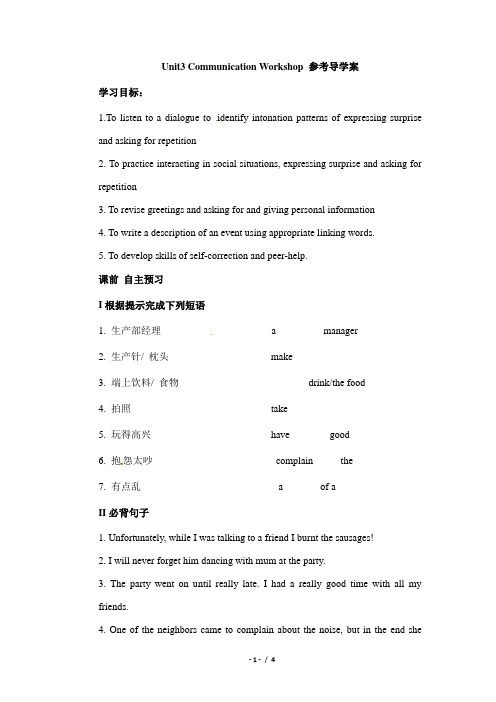
Unit3 Communication Workshop 参考导学案学习目标:1.To listen to a dialogue to identify intonation patterns of expressing surprise and asking for repetition2. To practice interacting in social situations, expressing surprise and asking for repetition3. To revise greetings and asking for and giving personal information4. To write a description of an event using appropriate linking words.5. To develop skills of self-correction and peer-help.课前自主预习I根据提示完成下列短语1. 生产部经理 a _________manager2. 生产针/ 枕头make_________ _________3. 端上饮料/ 食物_______drink/the food4. 拍照take ______5. 玩得高兴have _______ good _______6. 抱怨太吵complain _____the ______7. 有点乱 a _______of a ________II必背句子1. Unfortunately, while I was talking to a friend I burnt the sausages!2. I will never forget him dancing with mum at the party.3. The party went on until really late. I had a really good time with all my friends.4. One of the neighbors came to complain about the noise, but in the end shecame in and had a drink.5. The last people to leave were Tom and Sarah.6. On the night of 31 October, after their crops had been harvested and stored for winter, the Celts began a 3-day New Year holiday.7. It was believed that any village that did not give food would have bad luck.8. Today, in the USA and the UK in particular, Halloween has become a special occasion for young people.9. October 1 is the day when the People’s Republic of China was founded.10.Since it is one of the longest holidays in the years, for most people it’s the time to get relaxed or go out of the city to travel.§核心词汇1.as well 意为“也,好”,用作副词,相当于too,常置于句尾。
高一英语北师大版必修1 Unit 3 Lesson 1 Grammar 学案
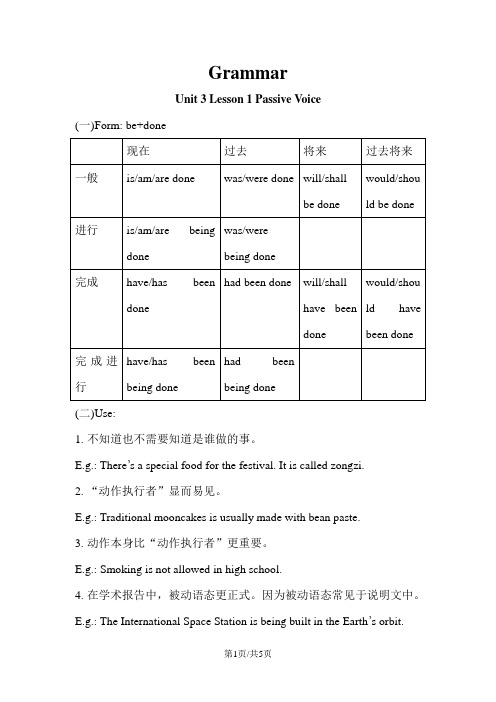
GrammarU nit 3 Lesson 1 Passive Voice(一)Form: be+done(二)Use:1.不知道也不需要知道是谁做的事。
E.g.: There’s a special food for the festival. It is called zongzi.2.“动作执行者”显而易见。
E.g.: Traditional mooncakes is usually made with bean paste.3.动作本身比“动作执行者”更重要。
E.g.: Smoking is not allowed in high school.4.在学术报告中,被动语态更正式。
因为被动语态常见于说明文中。
E.g.: The International Space Station is being built in the Earth’s orbit.(三)使用动词的被动语态应注意以下几点:1.不及物动词易被误用在被动语态中(只有及物动词有被动语态,因为只有及物动词有动作的承受者),如happen, take place, break out, break down, etc.E.g.: An accident happened on the highway yesterday.2. 并非所有及物动词都可以用于被动语态:表归属的词没有被动语态,如:have, lack, etc.3. 有些动词既可以作及物动词,也可作不及物动词,如:sell, wear, wash, weigh, measure, etc4.“get+done”可以表示被动,意为处于/达到...状态=to reach a particular state/conditionE.g.: The patient got treated once a week.5. ※※※主动形式表被动意义的情况:(1)不及物动词或短语动词一般不用于被动语态,因此,有些不及物动词的主动形式可以表达被动的意义,如:happen, cost, last, stay, belong to, take placeE.g: An accident happened on the highway yesterday.(2)系动词构成系表结构,如:look, sound, feel, smell, taste, appear, seem, go, prove, turn, stay, become, get, grow, keep等+adj./n.E.g.: The steel feels cold.His plan proved (to be) practical.It has gone bad.(3)表示主语的某种属性特征的动词,如read, write, act, iron, cut, draw, drive, sell, wash, clean, wear, open, cook, lock, shut, dry, eat, drink。
北师大版高中英语必修1 Unit3 Lesson 1参考教案
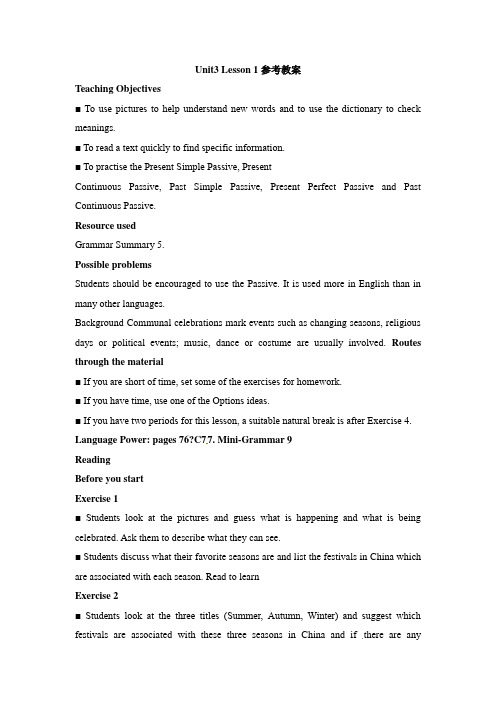
Unit3 Lesson 1参考教案Teaching Objectives■ To use pictures to help understand new words and to use the dictionary to check meanings.■ To read a text quickly to find specific information.■ To practise the Present Simple Passive, PresentContinuous Passive, Past Simple Passive, Present Perfect Passive and Past Continuous Passive.Resource usedGrammar Summary 5.Possible problemsStudents should be encouraged to use the Passive. It is used more in English than in many other languages.Background Communal celebrations mark events such as changing seasons, religious days or political events; music, dance or costume are usually involved. Routes through the material■ If you are short of time, set some of the exercises for homework.■ If you have time, use one of the Options ideas.■ If you have two periods for this lesson, a suitable natural break is after Exercise 4. Language Power: pages 76?C77. Mini-Grammar 9ReadingBefore you startExercise 1■ Students look at the pictures and guess what is happening and what is being celebrated. Ask them to describe what they can see.■ Students discuss what their favorite seasons are and list the festivals in China which are associated with each season. Read to learnExercise 2■ Students look at the three titles (Summer, Autumn, Winter) and suggest which festivals are associated with these three seasons in China and if there are anyassociated with Spring.■ Stude nts read the texts quickly and do the matching.AnswersPicture 1?CC the Dragon Boat FestivalPicture 2?CA the Mid-Autumn FestivalPicture 3?CB the Lantern FestivalExercise 3■ Divide the class into three groups. Each group reads one section of the text carefully and writes four or five questions about it. Then give the class three or four minutes to read the whole text again. Stu dents close their books, and in turn each group asks its questions for the rest of the class to answer.■ Students read the text again and fill in the table with the t ext information they get. ■ Have students check their answers in pairs.■ Encourage students to add another festival they know well.■ Students read the questions and find the answers in the texts by read ing the texts again.■ Have students talk about their festival in pairs.AnswersPassage A:the Mid-Autumn Festival, September or October, moon cakesPassage B:the Lantern Festival, the fifteenth of the first month of the lunar calendar, sweet dumplingsPassage C:the Dragon Boat Festival, the fifth day of the fifth month of the lunar calendar, Zongzi Exercise 4■ Students discuss in pairs and tell the class their opinions.Language Power: the Word Corner on page 79 givesfurther practice in vocabulary (clothes).Grammar。
北师大版高一英语上U3-L1教案
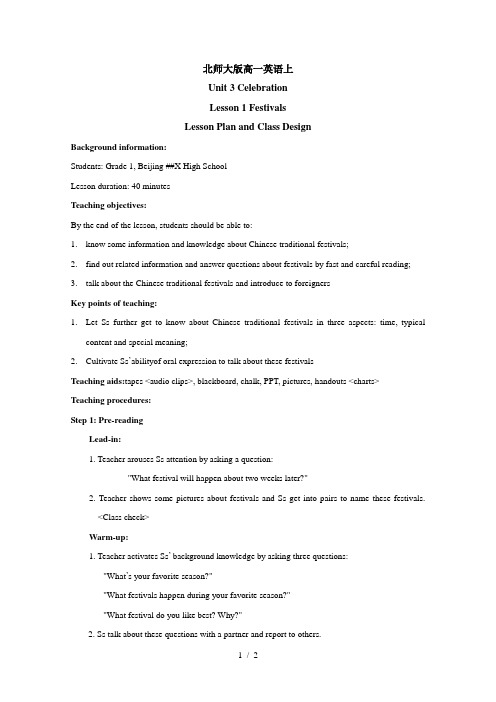
北师大版高一英语上Unit 3 CelebrationLesson 1 FestivalsLesson Plan and Class DesignBackground information:Students: Grade 1, Beijing ##X High SchoolLesson duration: 40 minutesTeaching objectives:By the end of the lesson, students should be able to:1.know some information and knowledge about Chinese traditional festivals;2.find out related information and answer questions about festivals by fast and careful reading;3.talk about the Chinese traditional festivals and introduce to foreignersKey points of teaching:1.Let Ss further get to know about Chinese traditional festivals in three aspects: time, typicalcontent and special meaning;2.Cultivate Ss’abilityof oral expression to talk about these festivalsTeaching aids:tapes <audio clips>, blackboard, chalk, PPT, pictures, handouts <charts>Teaching procedures:Step 1: Pre-readingLead-in:1. Teacher arouses Ss attention by asking a question:"What festival will happen about two weeks later?"2. Teacher shows some pictures about festivals and Ss get into pairs to name these festivals.<Class check>Warm-up:1. Teacher activates Ss’ background knowledge by asking three questions:"What’s your favorite season?""What festivals happen during your favorite season?""What festival do you like best? Why?"2. Ss talk about these questions with a partner and report to others.Step 2: While-readingBefore reading:1. Teacher introduces some new words and expressions with pictures.Fast-reading:1. Ss listen to the audio clip and read the text quickly, match the pictures with the festivals ontextbooks, and then tellthe teacher which festival each of the following sentences belongs to.2. Ss read the text again and do some T or F exercise.Careful reading:1. Each student gets a piece of paper and fills in the form according to the text, and they checkwithin groups. <Class check>Step 3: Post-readingTask:1. Ss write down the information of another typical festival on the paper, and then share withingroups2. Each group picks up one person to present in class.Discussion:1. Ss discuss with a partner and answer the following questions:"Do you think too much money is spent at festival times? Why or why not?""Which festival in China do you think is the most important? Why?"Step 3: Homework1. After class Ss read this text again. Write an article about one of the Chinese seasonal festivals2. Design a poster of this festival. The introduction and decorations like drawing pictures orphotos must be included in posters.。
- 1、下载文档前请自行甄别文档内容的完整性,平台不提供额外的编辑、内容补充、找答案等附加服务。
- 2、"仅部分预览"的文档,不可在线预览部分如存在完整性等问题,可反馈申请退款(可完整预览的文档不适用该条件!)。
- 3、如文档侵犯您的权益,请联系客服反馈,我们会尽快为您处理(人工客服工作时间:9:00-18:30)。
The heart attack could be related to his car crash last year.Much of the crime in this area is related to drug abuse.同义词组have something to do with2. What do you think of…= How do you find…= how do you feel about …你认为……怎么样?What do you think of the TV series ?= How do you find the Tvseries?3. separate Vt.1) 把……分开Please separate the big apples from the small ones.2) 从中隔开(两国,两地)England is separated from france by the Channel. 英国与法国之间隔着英吉利海峡。
1.Taiwan, _____ from the mainland by the Taiwan Strait , is not a _____ country but part of China.A. separated, separateB. separated, separatedC. separate , separateD. separate, separated Divide …into .把……分开Divide the apple into two and give one to her.辨析:1)Separate 侧重两个整体分开。
2) divide把整体分成若干部分。
4. lift off (火箭,宇宙飞船)升空,发射The rocket lifted off from the launching pad.Take off 飞机起飞,事业成功5. millions of 数百万的Millions of people will see the film.There are 3 million people here.2.______ people in the world are sending information by E-mail every day.A. Several millionB. Several millionsC. Many millionsD. Some millions注:million与数字连用,用单数;只有表示数百万的时候才用复数6. The spaceship, called Shenzhou V, was carrrying China’s first astronaut, Yang Liwei.过去分词短语called Shenzhou V 作定语,相当于which was called Shenzhou V1)过去分词作定语,常位于所修饰的名词之前;过去分词短语作定语时,则位于所修饰的名词后,相当于一个定语从句。
过去分词表达的内容与被修饰的名词具有完成和被动关系。
You should improve your spoken English.What’s the language spoken (=that is spoken ) in that area?The boy, named Tom, is my brother.Chen wrote about the efforts to bring stolen cultural relics back to China.The letter mailed last night will reach him tomorrow.a doll given by my aunt高考在线3.The trees _____ in the storm have been moved offf the road.A. being blown downB. blown downC. blowing downD. to blow down4.What should you do if there is no food __ for you when you get home after a day’s work ?A. is leftB. leftC. leaveD. leaving5.The Olympic Games ,_____in 776 BC, didn’t include women players until 1912.A. first playingB. to be first playedC. first playedD. to be first playing6.The first text books _______ for teaching English as a foreign language came out in the 16th century.A. having writtenB. to be writtenC. being writtenD. written7. choose chose chosenchose a from b 把a从b中挑出选出we have to choose a new manager from them.7.We offer a wide range of holidays to ______.A. chooseB. choose fromC. chosenD. choosing choice n.have no choice but to dohave nothing to do but dothere’s no choice but to do 别无选择只能做……I have no choice but to hand in my composition.Ther’s no choice but to hand in my composition.I have nothing to do but hand in my composition.8.Because 表示原因,不与so连用I did it because he told me to.Just because I don’t complain, people think I’m satisfied.Because ofHe walked slowly because of his bad leg.9. yang had sevaral tasks to complete during the flight.To complete complete YangTom is looking for a room to live in.I have a meeting to attend today.Have you got anything to send?(你去执行的动作)Have you got anything to be sent?(你有什么东西让别人寄)注:1)作定语的不定式如果为,则不定是后须加介词2)如果句子主语是不定式的动作执行者,用主动;若不是,则不定式用被动。
With the world changing fast, we have something new ____ all by ourselves every day.A. to dealB. to deal withC.to be dealt withD. dealing withHave you decided which subject ____ as your major?A to chooseB . to be chosen C. chosen D. will chose I’m going to Beijing next week; do you have anything _____ to your parents?A. to be takenB. to takeC. takingD. will take10. Wish / hopeShe hopes to get a job.= She wishes to get a job. = She hopes that she can get a job. = She wishes that she can get a job.I wish you to finish the job.= I hope that you can finish the job.注意:hope to do ,hope that. Wish to do ,wish that 意思相同.可以说wish sb to do,却不能说hope sb to do.2) wish后加虚拟语气, 表示但愿, 要是……就好了I wish I were you.I wish I had gone there yesterday.I wish I would go to London tomorrow.3). Wish 表示祝愿,祝福I wish you good luck. 祝你好运I wish you a safe journey. 祝你一路平安。
I wish you a merry Christmas. 祝你圣诞快乐10. Let out 释放,发出(叫喊),泄密She let out a scream.Don’t let it out about me losing my job,will you?不要说出我丢了工作这件事,好吗11. 现在分词作状语时,常可以表达伴随、原因、结果、时间、条件、让步情况,1.表伴随Can't you read?' Mary said angrily pointing to the notice.The children ran out of the room, laughing and talking merrily.They stood there for an hour, watching the game.She sat at the desk reading a newspaper.Traveling by jeep, we visited a number of cities.Following the guide, they started to climb.2).表原因Having eaten too much, he couldn’t go to sleep.Having finished his homework, he went out. =As he had finished his homework, he went out. 做完作业后,他出去了。
